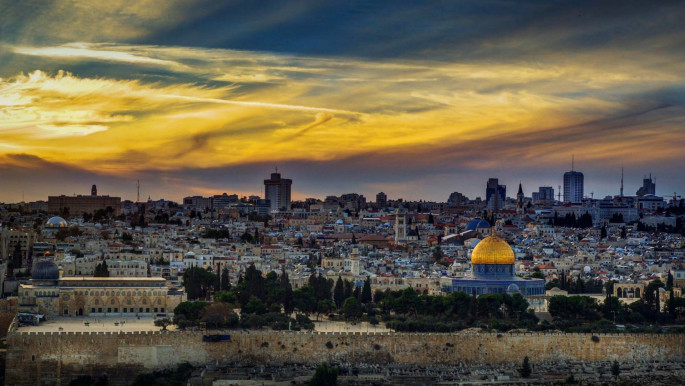How US blackmail pushed Sudan to normalise ties with Israel
The writing was on the wall. Months before news reports about an impending deal, Sudan's military rulers sent signals about their readiness to embrace Israel in exchange for international support.
The most obvious such signal was an unannounced meeting between Abdel Fattah Al-Burhan and Israeli Prime Minister Benjamin Netanyahu in Uganda in February 2020, a mere day after Al-Burhan was invited by US Secretary of State Mike Pompeo for talks in Washington.
The meeting, which sparked controversy within Sudan's fragile military-civilian coalition, was pushed for by the US and encouraged by Al-Burhan's patrons, Saudi Arabia and the United Arab Emirates (UAE).
In the same manner, the normalisation deal between Sudan and Israel was the result of political and financial extortion by the Trump administration. Adding to the complexity and irony is that this extortion was facilitated and funded by some Gulf States, who pushed Sudan over the normalisation cliff in order to advance their agenda in the region.
 |
The deal, along with funding and political support from the UAE and Saudi Arabia, will only strengthen Al-Burhan and his military allies in Sudan |  |
It happened a few days after the flamboyant signing ceremony at the White House of 'peace deals' between the UAE, Bahrain, and Israel. White House National Security Council's senior Director for Gulf Affairs, Brig. Gen. Miguel Correa and UAE's National Security Advisor Tahnoun Bin Zayed boxed in Sudanese Prime Minister Abdallah Hamdok and his justice minister, who also happens to be a US citizen, in the UAE for trilateral talks.
The focus was Sudan's coveted goal: getting delisted from the US list of State Sponsors of Terrorism in exchange for normalisation with Israel. Already, the US secretary of state had informed rulers in Sudan during his August visit to Khartoum that they had until the end of October to reach this deal; conspicuously timed to benefit Trump's re-election chances.
 |
|
| Read more: How the Israel-UAE alliance formalises new fault lines in the Middle East |
The extortion was clear and public. Sudan must pay $335 million in compensation to the United States and make friends with Israel in order to receive up to $2 billion in urgently needed food and oil assistance as well as help repaying its crushing $62 billion foreign debt.
The UAE and Saudi Arabia had pledged to assist Sudan with $3 billion after the overthrow of Omar Al-Bashir, but such unconditional support was no longer in play.
Interestingly, Omar Al-Bashir had warmed up to both states towards the end of his rein. He had even sent a military contingent to fight alongside Saudi Arabia and the UAE in Yemen, led by none other than Abdel Fattah Al-Burhan.
But this was not enough to sustain his grip on power. When the protests in Sudan started, the UAE and Saudi Arabia moved in to secure that a post-Bashir regime would strictly gravitate in their orbit. By 2020, it was time to collect on the political debt Al-Burhan and the rest of the military figures owed.
Dizzy with normalisation fever, the UAE pressured Al-Burhan towards acquiescence in exchange for financial assistance. This approach served two purposes. On the one hand, the UAE does not want to be alone on the normalisation train. Bahrain, being a satellite Saudi state, is not exactly company that carries enough regional weight.
 |
According to the Arab Opinion Index, 79 percent of the Sudanese people oppose normalisation |  |
On the other hand, the UAE rulers understand that extending this service would gain them more of Trump's favour. After all, the US president is packaging these 'peace' deals as grand achievements that his Evangelical base and right-wing donors are overly eager to support during the increasingly tight race for the White House, especially with more such deals promised 'soon.'
After the Trump announcement about the 'deal', the acting Foreign Minister Omar Gamareldin, a technocrat, was quick to admit that the military and civilian rulers of Sudan lack the legitimacy and mandate to make this decision. Under the transition to civilian rule agreement in Sudan, the yet unformed legislative council would have to endorse the normalisation deal before it becomes formal.
But a critical look at the happenings in Sudan clearly shows that the balance of power is now tipping in the direction of the generals, not civilians. After all, it is the generals who are signing peace deals to end civil wars inside Sudan, sharing a stage with the international and regional big guns, and securing what Sudan needs most: economic relief.
 |
|
| Read more: As Arab countries edge towards Israel, what's next for the Palestinian national movement? |
Sudan's economy is in tatters. In addition to crippling debt and civil strife, the African Union projects that GDP will contract by 1.6 percent in 2020 and 0.8 percent in 2021, with inflation now at 61.5 percent and expected to go higher next year. Meanwhile, the IMF forecasts economic stagnation for Sudan.
The announced deal with Israel and the United States, along with funding and political support from the UAE and Saudi Arabia will only strengthen Al-Burhan and his military allies in Sudan, possibly setting the stage for a new form of military rule in the country only this time with international blessings. It is a covert political overthrow of the fragile new social contract Sudanese civil society and political parties were hoping to forge following the overthrow of Al-Bashir.
In this grand play for power, the popular sentiment and political opposition in Sudan have been disregarded. According to the Arab Opinion Index, 79 percent of the Sudanese people oppose normalisation. Not surprisingly, political parties and professional associations represented, including those in the governing coalition have decried the deal as illegitimate.
 |
Upcoming US elections could complicate things for generals in Sudan and the Gulf rulers eager to further advance their military, political, and economic partnership with Israel |  |
In response to the overwhelming opposition, the deputy head of State and feared general, Mohammed Hamdan "Hemeti" Dagalo said "Sudan needs Israel." No surprise given that Hemeti, who made his fame by being the pro-Bashir military man in Darfur, is also interested in cleansing his political credentials from any Western objections.
Upcoming US elections could complicate things for the generals in Sudan and the Gulf rulers eager to further advance their military, political, and economic partnership with Israel. A Biden administration will support normalisation with Israel but not at any cost.
 |
|
| Read more: US election 2020: What's at stake for Palestine? |
Particularly, the UAE and Saudi Arabia could face significant pressure from a Democratic administration to end their brutal war in Yemen and their military exploits elsewhere in the region. Such a change could alter the political calculus and dynamics in Sudan.
In Palestine, the sentiments towards the Sudan announcement are more nuanced than the unequivocal anger regarding the deals signed between the UAE and Bahrain with Israel.
Palestinian intellectuals and politicians are aware of the punishing circumstances in Sudan and the bullying it faced to make this move. Many described the deal as a confession extracted under torture. Despite decades of autocratic rule, Sudan boasts a vibrant political and civil society scene that has longstanding relations with Palestinian partners.
Between Jerusalem and Khartoum, there is shared concern that this deal only entrenches the hegemony of Israel, bankrolled by Gulf dollars. The weeks ahead and the outcome of US elections will decide whether Palestinians and the Sudanese will have any chance of confronting this forced normalisation avalanche.
Nour Odeh is a political analyst and public diplomacy consultant. A former award-winning journalist, Odeh was also Palestine's first female government spokesperson
Follow her on Twitter: @nour_odeh



